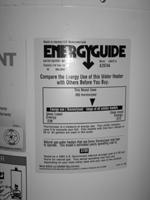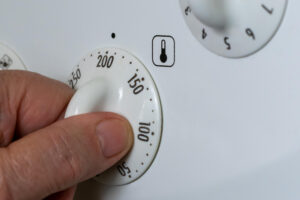When making a purchase, look at the energy guide
Last updated on March 10th, 2024 at 03:40 pm
If you live in the United States, the Government requires that appliances have an energy guide, which is a yellow decal applied to the appliance that tells you about the efficiency and energy usage of the appliance.
Compare energy guides when shopping – you can potentially save a lot of money by purchasing an appliance that uses less energy.

Yes, but what is the Energy Guide exactly?
Well, the Energy Guide program was started by the US Government to test the energy efficiency of various appliances. It attempts to set baselines for energy usage and approximate energy costs based on average usage. The labs that test the appliances examine numerous components of the appliance (depending on the unit) and how the unit uses energy as a whole.
There are a few important things to remember when it comes to Energy Guides. First, to create a baseline, the labs examine a wide range of appliances in the same class. So stoves are measured against other stoves that are similar. Likewise refrigerators are matched against other refrigerators. So, a stand alone freezer is NOT compared against refrigerators.
Second, the baseline range is composed of the upper and lower limits of energy usage for that class of appliance. So, the stove that uses the most energy and the stove that uses the least (the most efficient one by definition) make up the end points of the line you typically see on the sticker. All other appliances are plotted somewhere between these two points.
Keep in mind the dollar amounts are based on estimates assuming a certain unit cost of energy which may or may not be the same for you. In other words, your actual cost and savings will definitely vary. It is important to look at the guide as a whole. In other words, where your appliance falls in relation to other appliances.
Also, remember that for the most part, the most energy efficient appliances are usually the more expensive ones. So it is important to compare your immediate costs with the potential savings.
For example, let’s say that a new stove you are looking at costs $750 for an energy star one versus $600 for a non energy star unit. Thats a difference of $150. Now, look at the energy guides. Compare the relative costs (keeping in mind yours will vary) and lets say that there is a difference of $25. Assume the unit has the same features you need, and assume you would need to use each one for the same amount of time.
Based on rough calculation, it would take 6 years (which is usually the unit on energy guides) to make up for the savings.
Now there are other factors to consider, one of which is how the unit is built. The energy star unit, or one that uses less energy than its counterpart may be built in a more efficient way, and maybe make use of better insulation or quality parts. This means, in theory, you could actually use less energy in part because you use it less than you would its counterpart. This could actually affect our cost calculation, because all of a sudden usage is different.
Another to consider is the relative “power” or energy of the components. In our stove example, if the two units have different burners with different ratings (10,000 BTU vs 15,000 BTU) obviously the one with 10K BTU is going to use less energy. You have to ask yourself what you really need, then balance that with the unit features and cost. It makes no sense to get a low power burner if you use it twice as long.
Another classic example is a hot water heater. If you are shopping for a new hot water heater, pay attention to the energy guides. The big thing to remember is insulation and size. If you get a heater that is too big, you are wasting money. You can find more about hot water heaters in the article labeled “Hot Water Heater Buying Guide.”
Also, it is worth noting that gas and electric appliances are typically treated separately. So don’t compare a gas range and over to an electric one. Their energy guides are based on different criteria depending on their energy source. Likewise with hot water heaters or any other appliance for that matter.


